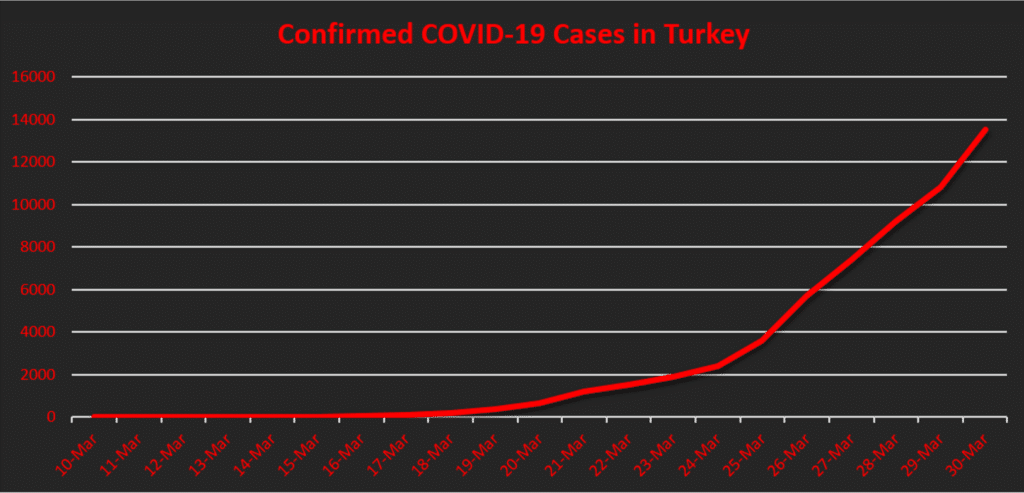April 1, 2020 | Policy Brief
COVID-19 in Turkey
April 1, 2020 | Policy Brief
COVID-19 in Turkey
Turkey’s coronavirus epidemic is one of the most serious in the world; it has the second-largest number of confirmed cases in the Middle East, behind only Iran. With the country’s public health crisis set to intensify, the epidemic threatens to destabilize Turkey’s already precarious political, security, and economic situation, while providing added impetus for Turkey’s authoritarian turn under President Recep Tayyip Erdogan.
Situation Overview
Turkey has reported 15,679 confirmed cases and 277 deaths, though the actual figures are likely far higher. Turkey reported its first officially confirmed case on March 10, and the country’s total number of cases has increased more than four-fold within just the last week. In response, Ankara has banned international flights and inter-city travel within Turkey, imposed restrictions on Turkish supermarkets and public transportation, and closed down schools, sporting events, and restaurants, among other measures. Ankara has also issued a raft of economic stimulus measures, but they look unlikely to provide much relief.
Within Turkey’s ruling Justice and Development Party (AKP), there is much debate on whether to institute a full lockdown, like Italy, or simply to impose partial restrictions in order to mitigate the economic fallout. Regardless, opacity promises to remain a key feature of the Turkish government’s response. Meanwhile, Ankara has turned to China for up to 1 million testing kits and an experimental drug, while criticizing Europe for allegedly endangering the world through a negligent response to the pandemic.
COVID-19 in the Greater Middle East
| Country | Cases | Deaths |
| Iran | 47,593 | 3,036 |
| Turkey | 15,679 | 277 |
| Israel | 5,591 | 25 |
| Pakistan | 2,118 | 27 |
| Saudi Arabia | 1,720 | 16 |
| Algeria | 847 | 58 |
| Qatar | 781 | 2 |
| Egypt | 710 | 46 |
| Iraq | 694 | 50 |
| UAE | 664 | 6 |
| Morocco | 642 | 37 |
| Bahrain | 567 | 4 |
| Lebanon | 479 | 14 |
| Tunisia | 394 | 12 |
| Kuwait | 317 | 0 |
| Jordan | 278 | 5 |
| Oman | 210 | 1 |
| Afghanistan | 196 | 4 |
| W. Bank & Gaza | 134 | 1 |
| Libya | 10 | 0 |
| Syria | 10 | 2 |
| Sudan | 7 | 2 |
| Somalia | 5 | 0 |
| Yemen | 0 | 0 |
Source: JHU Coronavirus Resource Center
Data current as of 3:30 PM, April 1, 2020.
Implications
COVID-19 severely complicates a Turkish political environment already beset by years of repression, economic malaise, and refugee problems. For Erdogan, the crisis will test his ability to enforce restrictions on movement, which may prove extremely difficult given that 4.1 million refugees live within Turkey’s borders. Weary of previous encroachment on their civil liberties by the ruling Justice and Development Party (AKP), opposition parties are likely to protest any attempt by Erdogan to declare a state of emergency, though they generally support a strict lockdown. There is also much concern over the potential for COVID-19 to spread in prisons, which could endanger the lives of key jailed opposition figures. While the government plans to release up to a third of Turkey’s prisoners, political prisoners will remain incarcerated.
The epidemic has also exacerbated problems surrounding Syrian refugees in both Syria and Turkey, whose health and safety are already imperiled. Within the areas of Syria controlled by Turkey and its rebel allies, hospitals, medical care, and even running water are virtually non-existent. Consequently, it would inevitably fall upon Turkey to provide medical assistance in the event that northwest Syria devolves into a public health catastrophe. With the recent Russia-Turkey truce in Idlib unlikely to hold for long, a renewed Assad regime offensive and resultant refugee crisis could be in the offing. At home, meanwhile, COVID-19 could wreak serious havoc upon Turkey’s increasingly unpopular refugee community, which Erdogan has previously sought to weaponize to extract financial support from the European Union. As the epidemic’s political and economic costs grow, Erdogan may decide to resume his efforts to forcibly resettle Syrian refugees in makeshift “safe zones” in northern Syria or send them pouring into Europe.
What to Watch for
Public health experts are concerned Turkey will follow a similarly deadly trajectory as its Southern European counterparts Italy and Spain, and that Turkey’s hospitals are not prepared for a massive influx of patients. As Turkey’s epidemic continues to worsen, Erdogan may use the crisis as an opportunity to consolidate his grip on power and draw closer to authoritarian, non-Western regimes at the expense of Turkey’s already fraught relations with the European Union.
Aspiring autocrats in Turkey’s neighborhood have already attempted to do so. Serbia, for example, has undertaken an authoritarian, Chinese-influenced response to the pandemic, while Hungary has shut down its parliament and granted expansive emergency powers to Prime Minister Viktor Orban. Given Erdogan’s track record, it would be unsurprising to see him pursue similar measures.
Philip Kowalski is a research associate at the Foundation for Defense of Democracies (FDD), where John Hardie is research manager. For more analysis from Philip, John, and FDD, please subscribe HERE. Follow Philip on Twitter @philip_kowalski. Follow FDD on Twitter @FDD. FDD is a Washington, DC-based, nonpartisan research institute focusing on national security and foreign policy.
